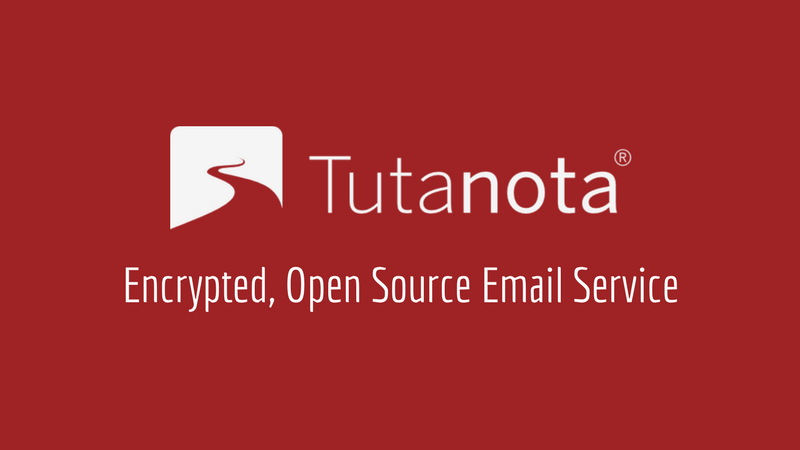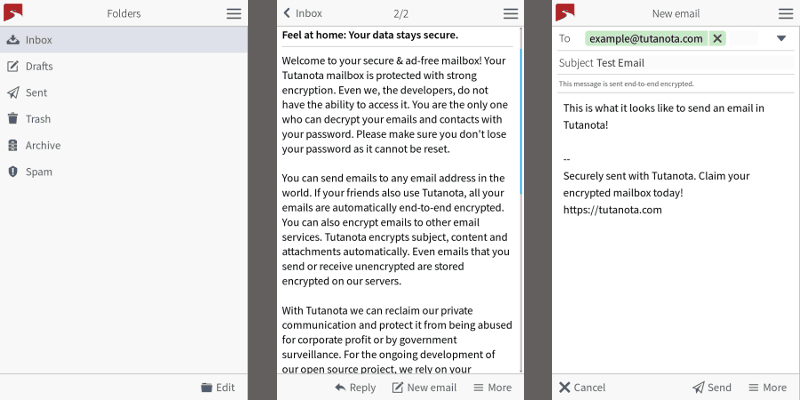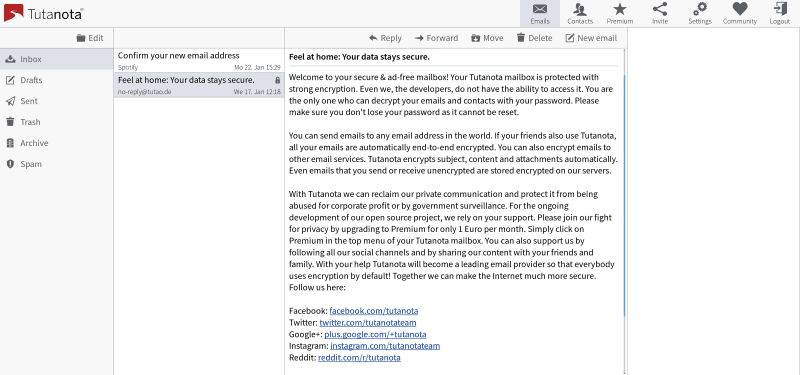A little while back, I reviewed an email service call ProtonMail. I had been a long time ProtonMail user by that time, and I had little negatives to say about the service. In fact, I went so far as to say that everyone should use it.
Since then, I have heard of another email provider that you may be interested in. It’s a little different, but it touts some of the same features ProtonMail does: privacy, security, open-source code, etc. It’s called Tutanota, and like ProtonMail, I am a very big fan.
Without wasting any time, here’s why I think Tutanota is worth your time.
What is Tutanota:

Tutanota is a German based, privacy-focused secure email service provider. The Tutanota team refers to their product as “Secure mail for everyone!”, exclamation point and all. This lets us know that just because they tout a crazy sounding feature like “end-to-end encryption” doesn’t mean the average joe computer user can’t utilize their service. That’s because, unlike ProtonMail, Tutanota does not advertise its location as a feature of the service, and instead puts their marketing emphasis on encryption and ease of use. Which, as you will see later, is much deserved.
[irp posts=”25183″ name=”8 Privacy Oriented Alternative Search Engines To Google in 2018″]
Why use Tutanota:
Here are just a few of the many reasons you may want to choose Tutanota as your next email provider.
1. Privacy and Security
It makes sense that with an email client that advertises itself as private and secure that their customers would benefit from privacy and security. And in Tutanota’s case, that is absolutely true. Now, I can’t really speak to that as I don’t believe anyone has tried to intercept my emails since I have been using the product, but the features themselves seem promising.
Unlike other email clients, Tutanota has multiple ways that it has implemented encryption. It has end-to-end encryption between Tutanota clients, as well as optional password protected encryption when a Tutanota user is emailing someone using another email provider. How this works is if I, a Tutanota user, wants to send an encrypted email to my coworker, a Gmail user, for example, we can agree on a predetermined password that will allow us, and only us, to see the email. How this works is when I write the email, I have the option to encrypt it with a password. Then when the recipient receives the email, the only way for them to read the email is by inputting that password I set to encrypt the email. This way of doing this is simple, seamless, and secure. Though there are other email providers that do something similar, I have not found one that does it is easily as Tutanota.
2. Custom Domain
Like almost every other email client, you get a custom email address under the Tutanota domain when you sign up for an account. But, similar to ProtonMail, Tutanota offers a couple pricing tiers for users to choose from, starting at a grand total of $0 a month, and working its way up from there.
The main difference between the free account and the paid offerings is that the free account has limited users, limited storage, the inability to use a custom domain, slightly less customization, and the free account only has community support with the paid accounts have premium support from the Tutanota staff. Then, starting at 1€ a month, or about $1.24USD a month, the number of users, storage, etc. increases depending on how much you pay.
[irp posts=”17908″ name=”Librem 5 is a Security and Privacy Focused Smartphone Based on Linux”]
3. Open Source
Does this one really need any more explanation? Since Tutanota is open source, under the GPL v3 license, us users can be certain that our rights are not infringed upon, as well as all the other goodies that come with an open source product.
4. Simple to Use
This is where I think Tutanota has it’s real competitive advantage. It is one of the most simple email clients to use that I have come across. Even email clients that I did not think were confusing before, like Gmail, now seem confusing compared to Tutanota. I would like to say that I could count on the community to help me if something went wrong, but since Tutanota was so easy to set up and use, I don’t know when I would reach out to them to find out. It was so simple, that I would feel comfortable enough signing my grandparents up for a Tutanota account knowing that they would be able to use the product without much guidance and that they wouldn’t accidentally break something in everyday use. To use the provider the user needs to use the web interface or custom applications, and both of these are designed very intuitively and are easy to digest. Which brings me to my next point.

4. Cross-Platform
Since Tutanota uses encryption, you cannot use third-party email clients, but Tutanota has done a fantastic job developing their web application as well as custom applications for both Android and iOS. That means whatever device you use, as long as it has a browser, you will be able to use Tutanota.
[irp posts=”14152″ name=”Best Linux Distributions For Privacy Freaks”]
Downsides of using Tutanota:
Just because Tutanota is secure, easy to use, and open source, doesn’t mean the experience is completely perfect. Here are some negatives you may run into using the product.
1. No Third-Party integration
Like I just mentioned, since Tutanota uses encryption there is no ability to use third-party email clients. That means I cannot use Tutanota on some of my favorite email applications like Thunderbird, Geary, or even K-9 Mail. I am stuck using the Tutanota mobile application and the web app. This isn’t all that bad, but since I use other email accounts for work and my personal life, this just means there has to be yet another application on my phone, and one more tab open in my browser in order to everyday tasks.
[irp posts=”26982″ name=”Mycroft Mark II: The Open Source Answer to Amazon Echo and Google Home That Doesn’t Spy on You”]
2. Limited Features
On the free account, you only get up to 1gb or storage, no premium support, and you only have one user. This may be fine if you are just using the application for personal everyday use, but for something more professional you will need to fork up some cold hard cash to get some of the features you might be wanting.
Another limitation is just how the encryption works. Password protected emails to non-Tutanota users can only truly function unidirectionally, which means only emails that I initially send out can be encrypted. If another email provider emails me first, then the email will not be encrypted, making the communications susceptible to interception.
For me, the worst part about Tutanota’s free account is the domain. You have the choice to choose between a couple different variations of the word Tutanota, including tuta and tutamail, as well as the option to use keemail, as the domain at the end of your email address, but honestly, I can’t say I am a fan of the domain options. With all due respect, I just don’t really like the way “[email protected]” sounds. Maybe I am being picky, but ProtonMail sounds a little less goofy to me, and other options like Gmail and Yahoo are more commonplace so they don’t sound as out of place. This is just my opinion.
[irp posts=”27228″ name=”Min: An Open Source Web Browser for Minimalists”]
3. No easy account recovery
Like all products that utilize encryption, recovery is a headache. Since Tutanota treats its customers like adults, we are expected to be responsible and remember our passwords. That means keeping your password in a safe, secure, and probably offline location is a must. This really isn’t that big of a deal if you take the necessary precautions. So be intentional about creating a safe and secure password and be sure to keep track of it, and you will be fine.

Conclusion
When all is said and done, Tutanota is a fantastic option to consider when you are thinking about choosing an email provider. I have definitely adopted it as one of my two main personal email providers, as well as ProtonMail. The community seems vibrant, though haven’t needed to reach out to them for support since the product is dead simple, and it is easy to contribute to the project for those who so desire.
Tutanota truly stands out in my mind as a straightforward, minimalist approach to encrypted communication. In a world that seemingly needs to pump more functionality into every product, Tutanota does to the opposite. There are no unnecessary features, no confusing language or crazy UI, just an awesome product that works as promised. What more could you possibly want from them?


